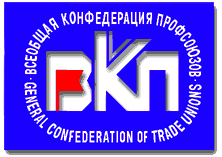Related Research Articles

The World Federation of Trade Unions (WFTU) is an international federation of trade unions established in 1945. Founded in the immediate aftermath of World War Two, the organization built on the pre-war legacy of the International Federation of Trade Unions as a single structure for trade unions world-wide, following the World Trade Union Conference in London, United Kingdom.

The General Confederation of Labour is a national trade union center, founded in 1895 in the city of Limoges. It is the first of the five major French confederations of trade unions.

The Norwegian Confederation of Trade Unions is a national trade union center, decidedly the largest and probably the most influential umbrella organization of labour unions in Norway. The 21 national unions affiliated to the LO have almost 1,000,000 members of a Norwegian population of 5 million. The majority of affiliated unions organizes traditional blue collar workers, but the largest affiliate is the Norwegian Union of Municipal and General Employees which makes up more than a third of all members. LO is affiliated to the ITUC and the ETUC.
A national trade union center is a federation or confederation of trade unions in a country. Nearly every country in the world has a national trade union center, and many have more than one. In some regions, such as the Nordic countries, different centers exist on a sectoral basis, for example, for blue collar workers and professionals.

The European Trade Union Confederation (ETUC) is the major trade union organisation representing workers at the European level. In its role as a European social partner, the ETUC works both in a consulting role with the European Commission and negotiates agreements and work programmes with European employers. It coordinates the national and sectoral policies of its affiliates on social and economic matters, particularly in the framework of the EU institutional processes, including European economic governance and the EU Semester.

The General Confederation of Trade Unions or GCTU is an international trade union confederation. It was founded on 16 April 1992 and incorporates members from the Commonwealth of Independent States.
The Central National de Trabajadores de Panama is a national trade union center in Panama. It is affiliated with the World Federation of Trade Unions.

The Confederation of Workers of the Republic of Panama is a national trade union center located in Panama. It has a claimed membership of 35,000 and is affiliated with the International Trade Union Confederation.
A company or "yellow" union is a worker organization which is dominated or unduly influenced by an employer and is therefore not an independent trade union. Company unions are contrary to international labour law. They were outlawed in the United States by the 1935 National Labor Relations Act §8(a)(2), due to their use as agents for interference with independent unions. However, company unions persist in many countries.

The International Trade Union Confederation (ITUC) is the world's largest trade union federation.
Trade unionism is a powerful force in the politics, economy, and culture of Senegal, and was one of the earliest trades union movements to form in Francophone West Africa.

The ICFTU Asia and Pacific Regional Organisation (APRO) was a regional organisation of the International Confederation of Free Trade Unions (ICFTU), representing trade unions from countries in Asia and Oceania.

The ICFTU Inter American Regional Organisation of Workers was the regional organization of the International Confederation of Free Trade Unions (ICFTU) for the Americas.
Trade unions in Guinea were historically important - having played a pivotal role in the country's independence movement - and in recent years have again assumed a leading role.
Disunited and poorly organized for most of its history, trade unions in Ecuador developed only slowly and had only a marginal political impact. Precise figures on unionization in the late 1980s were practically nonexistent, even within the unions themselves. The organized labor movement in Ecuador was divided into four confederations and a number of independent federations. At the local level, labor organizations also took the form of artisan guilds, cooperatives, and neighborhood associations. In addition to representing only a minority of the workers in all sectors of employment, the labor movement traditionally was weakened by rivalry and government repression. Nevertheless, it had influence disproportionate to its numbers as a result of the concentration of trade unions in urban areas, mainly Quito and Guayaquil, its organizational power, and the political impact of strikes and demonstrations on governments that did not enjoy strong support.
Trade unions in Colombia were, until around 1990, among the strongest in Latin America. However the 1980s expansion of paramilitarism in Colombia saw trade union leaders and members increasingly targeted for assassination. As a result, Colombia has been the most dangerous country in the world for trade unionists for several decades. Between 1986 and 2010 over 2800 labor leaders were killed according to one source, and over 4000 according to others. Most assassinations were carried out by paramilitaries or the Colombian military; some were carried out by the guerrillas. In 2009 only around 4% of workers in Colombia were unionized.
References
- ICTUR; et al., eds. (2005). Trade Unions of the World (6th ed.). London, UK: John Harper Publishing. ISBN 0-9543811-5-7.